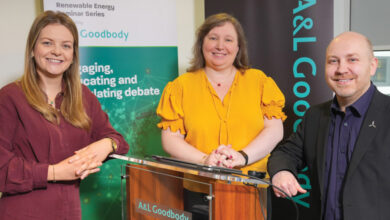Fracking and health
 New Brunswick’s Chief Medical Officer, Dr Eilish Cleary, has analysed the potential health consequences of hydraulic fracturing. During a visit to Ireland in January, she met residents in Fermanagh to discuss her report. Here, she answers agendaNi’s questions on its conclusions.
New Brunswick’s Chief Medical Officer, Dr Eilish Cleary, has analysed the potential health consequences of hydraulic fracturing. During a visit to Ireland in January, she met residents in Fermanagh to discuss her report. Here, she answers agendaNi’s questions on its conclusions.
What is your report’s key message for government?
A healthy population results from a delicate balance between the individual, their community and their environment. Psycho-social factors are a major contributor to ill-health. Therefore if the decision is taken to develop this industry, it will require a thoughtful approach, careful planning and an upfront investment of resources to mitigate the health risks involved. Prevention is better than the cure and is almost always cheaper in the long run.
And for local communities?
It is important for their health that local communities are engaged in the process and take an active interest in matters that concern them.
Do you have any suggestions on how to make the debate less polarised?
I would suggest that there has not yet been enough actual debate. The shale gas industry has the potential to significantly change the rural landscape and the fabric of small communities. Factual information needs to be shared. The specific risks and potential benefits need to be understood and openly discussed with genuine community involvement in the decision-making process.
This requires a different approach to the top-down model that has traditionally been used for industrial development. It will mean compromises on both sides but those should be weighted in favour of people and not industry. It means greater accountability and oversight by government. In my view, this should be the way forward not only for shale gas but for all our resource development.
Where did the main gaps in the data exist and how can the evidence base be improved?
Very little substantive data exist on any aspect of the health or environmental impacts of the shale gas industry. However, a growing body of ‘soft literature’ strongly suggests that many of the concerns identified through a theoretical health risk assessment warrant a closer look and reinforce the need for a prudent and cautious approach. So we need to systematically build in ways of measuring actual health and environmental outcomes, which is not currently being done. This should be routine practice.
In addition, we need on-going health and social policy research that can keep abreast of the fast-moving developments. Like any quality control measure, information should not be feared but be seen as a means to improvement. Such work must be intended first and foremost for the public good. It should be also be publicly available and open to scrutiny.
What health gains could result from the development of the industry?
There are no direct health gains. However, there could potentially be some indirect ones depending on net revenue and employment generated. Nevertheless, it must be borne in mind that a positive association between socio-economic status and health does not mean that populations that are wealthier are necessarily healthier.
Furthermore, the distribution of wealth across society is more important than the amount of total income. In order to have health gains in a population, the money must be invested in ways that leads to more health equity. Money would have to be spent in targeted ways on creating healthier social and physical environments. This requires sound planning and must be systematically built in upfront.
What do you see as the main potential risks from its development?
The risks are to all domains of health, including physical, mental and emotional, all of which cause problems for individuals, their families and society. In terms of physical risk, there has been a lot of discussion about the risks to our water and air. These are real and need to be taken seriously. Issues related to workers’ health and safety are also a concern. Furthermore, it has been recognised for centuries and well-described in the literature that rapidly rising and falling incomes and fast social change can be a threat to health.
Factors such as anxiety, frustrations, tensions and disruption of social cohesion manifest in ways such as mental illness, injury from violence, alcohol or other drug abuse, cardiovascular disease and other chronic diseases. The contribution of these factors, unfortunately, is often dismissed or overlooked.
 Which jurisdictions have handled the development of shale gas best?
Which jurisdictions have handled the development of shale gas best?
I’ve found it surprisingly hard to identify even one jurisdiction. Unfortunately, despite some very large developments, public health expertise has been missing from the table. I think this is the result of a lack of understanding by both industry and governments as to the nature of public health and why it is important.
Very often, they imagine that if you address the environmental concerns, you are by default addressing the health ones. We in public health know this not to be true. There can be a perception that many real public health concerns are unwarranted, particularly in relation to the psycho-social factors. Nor is it sufficient just to invite public health people to the table. It requires an investment upfront and that too is off-putting in these economically challenging times
What progress has been made on your report?
It’s a bit early to say. The report was published in October 2012, at which point the Government were working on some other aspects such as environmental rules for the industry.
The health piece is now being considered but exactly how it translates into actions remains to be seen.
What are your impressions of the debate in Ireland?
Very similar to that of New Brunswick. On one hand, there are many people with a strong and deep attachment to their land and environment and, on the other, a major industry whose top priority is not the preservation of the environment, communities and the health of people.
And in between are governments who are under intense fiscal pressure in a democratic system which favors short-term thinking.
Profile: Eilish Cleary
Originally from Ireland, Eilish Cleary has held her current post since 2008. She studied at Trinity College Dublin and was trained as a primary care physician before working in public health. She has worked in Ireland, England and Sierra Leone. New Brunswick has a population of 751,000 and a well-established oil and gas industry. Eilish Cleary’s report on fracking is available online at:
www2.gnb.ca/content/gnb/en/departments/ocmoh.html





